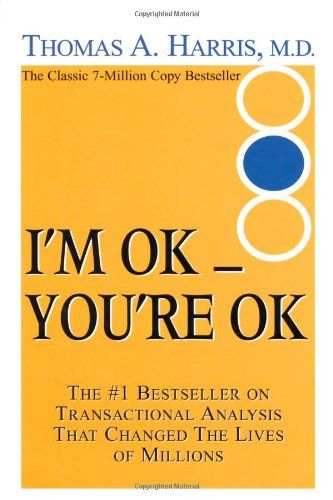I’m OK – You’re OK – Thomas A. Harris

I’m OK – You’re OK by Thomas A. Harris offers an insightful analysis of our human behavior through the science of Transactional Analysis. The book provides tools and techniques for better understanding, predicting, and managing our interactions with others.
Understanding Life Positions
Life positions are basic attitudes individuals adopt towards others.
There are four positions: I’m OK – You’re OK, I’m OK – You’re not OK, I’m not OK – You’re OK, and I’m not OK – You’re not OK.
These positions form early in life and shape interpersonal interactions.
Scripts and Life Plans
Scripts are unconscious life plans formed early in life, guiding individuals to predictable outcomes.
By examining personal history and emotional patterns, individuals can recognize their scripts, modify them and choose more fulfilling and authentic paths through conscious decision-making.
The Role of Autonomy
Achieving autonomy is essential for personal growth, defined by self-awareness, spontaneity, and the ability to experience intimacy.
Guided by the I’m OK – You’re OK life position and replacing old patterns with healthier alternatives, individuals can attain autonomy in their personal and professional lives.
Applying Transactional Analysis
Transactional Analysis serves as a catalyst for profound transformation and healthier relationships.
By applying its principles, individuals can enhance communication, self-awareness, and emotional intelligence, strengthening their capacities to foster fulfilling lives and authentic connections.
The Power of Strokes
Strokes are units of recognition that individuals give and receive in communication.
Positive strokes strengthen relationships and enhance self-esteem, while negative strokes generate conflict and reduce self-worth.
Acknowledging the value of positive strokes is essential in forming healthy interpersonal connections and fostering personal growth.
The Parent-Adult-Child Model
The Parent-Adult-Child Model identifies the distinct psychological ‘states’ individuals shift between in interactions.
The Parent state consists of societal norms; the Adult state focuses on logic and analysis; and the Child state involves emotions and past experiences.
Recognizing these states allows better communication and comprehension of others.
Games People Play
Games are dysfunctional repetitive transactions that individuals engage in to fulfill particular psychological needs, often at the expense of genuine connections.
Recognizing and understanding these patterns allow individuals to avoid unhealthy communication and seek more constructive interactions to satisfy their needs.
Interrupting Dysfunctional Patterns
By identifying dysfunctional patterns, such as games and life scripts, individuals can disrupt and improve these patterns through conscious intervention.
Adopting new healthier patterns and integrating positive transactions greatly impacts personal development and enhances emotional well-being.
Evolving Life Positions
Individuals can change their life positions by gaining self-awareness and understanding their transactions.
The ultimate goal is to achieve the I’m OK – You’re OK position, which leads to healthier relationships and a more authentic self, by recognizing and addressing our cognitive distortions.
Transactional Analysis Techniques
Transactional Analysis is a tool for understanding communication patterns, involving transactions between individuals’ Parent, Adult, and Child states.
Pertinent transactions are complementary or crossed, determined by the nature of the exchange.
Identifying these transactions allows for improved communication and fosters effective problem-solving in relationships.

